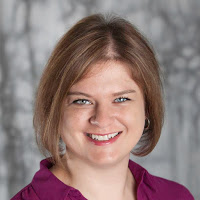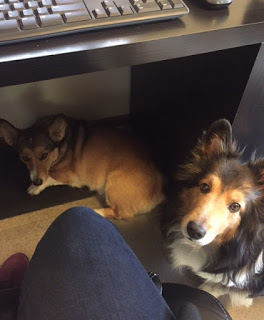I am Amanda Sewell and This is How I Work
 Today, I am inviting Amanda Sewell to the “How I Work” series. Amanda is a freelance academic editor in Michigan (USA). Amanda holds a Ph.D. in musicology from Indiana University, and her scholarship has been published in the Journal of the Society for American Music and the Journal of Popular Music Studies. She also contributed a chapter on nerdcore hip-hop to the recently-published Cambridge Companion to Hip-Hop. Additionally, Amanda is a part-time classical music host on Interlochen Public Radio. Check out her website, facebook, Twitter account and Academia.edu profiles.
Today, I am inviting Amanda Sewell to the “How I Work” series. Amanda is a freelance academic editor in Michigan (USA). Amanda holds a Ph.D. in musicology from Indiana University, and her scholarship has been published in the Journal of the Society for American Music and the Journal of Popular Music Studies. She also contributed a chapter on nerdcore hip-hop to the recently-published Cambridge Companion to Hip-Hop. Additionally, Amanda is a part-time classical music host on Interlochen Public Radio. Check out her website, facebook, Twitter account and Academia.edu profiles.
Current Job: academic editor
Current Location: Traverse City, MI, USA
Current mobile device: iPhone 6
Current computer: Asus Zenbook
Can you briefly explain your current situation and research to us?
I received my Ph.D. in musicology from Indiana University in 2013 and chose to go into business for myself as an academic editor. As an editor, I work with individual clients on their articles, dissertations, and academic book manuscripts, and I also perform contract work for various academic presses, including W. W. Norton and Oxford University Press. I do everything from proofreading and copy editing (adding commas or helping non-native English speakers sound more like native speakers) to developmental editing (aiding researchers in revising the direction, tone, or content of their projects).
As fate would have it, I wound up living ten miles from the Interlochen Arts Academy, one of the most respected institutions in the United States for training young musicians and artists. I now work part-time at Interlochen Public Radio as a classical music host, and I have also written program notes for the summer concert series.
I have published several peer-reviewed pieces since completing my Ph.D., but I am still working out how to balance my own research agenda with the career I have chosen. I struggle with the idea of giving up billable hours in order to do my own research, even though there are a lot of topics I want to investigate. Stay tuned as I continue to figure out this dimension of my life.
What tools, apps and software are essential to your workflow?
I’m pretty simple. I edit clients’ documents on my PC using Microsoft Word’s track changes feature and comment tool. To transmit documents and communicate with clients, I use Google apps (Gmail, docs, sheets, etc.), Dropbox, and whatever else the client needs. Some larger companies have their own systems, so I’m adaptable.
What does your workspace setup look like?
I have a home office, but if I’m feeling cagey, I can always go work in a coffee shop, public library, or other space. My work is portable, meaning that I can work almost anywhere, which is both a blessing and a curse sometimes.
I have two dogs who keep me company at home and remind me to take breaks. At 3 PM every day, like clockwork, my sheltie will bring me a tennis ball, as if to say, “Amanda, perhaps you should stretch a bit. Allow me to help you.”

What is your best advice for productive academic work?
My best advice is also the advice I find hardest to take myself. I’m always pushing and pushing, and I don’t always stop to refresh or decompress. Graduate school trained me to work 7 days a week, 52 weeks a year, which is a very difficult habit to break. I know, theoretically, that if I take a day (or even just a few hours) to relax in some way, I will return to my work with more energy and vigor. It’s often hard to give myself permission to take that break, though.
How do you keep an overview of projects and tasks?
I have a giant dry erase board where I list ongoing projects and their deadlines, outstanding invoices and their amounts, project quotes, and other miscellaneous reminders (“schedule March Facebook posts” or “conduct Ph.D. Talk interview”). I also use a wall calendar and the calendar on my phone for hard deadlines or appointments.
Besides phone and computer, do you use other technological tools in work and daily life?
No, but if I had it to do over again, I would take a course on how to use Microsoft Office, including Word and Excel. My skills are quite basic, and although they fulfill my present needs, I think I could accomplish much more much faster if I had greater knowledge of these programs.
Which skill makes you stand out as an academic?
I’m assertive and advocate for myself. A colleague recently teased me about “hustling” publishers at a conference, but how else will people know who I am and what I do if I don’t introduce myself? I can’t just put my website out there and hope people will find it – instead, I have to speak up and let people know about me.
That said, if you’re looking for an editor, or if you want to talk more about academic careers outside the academy, I would love to chat with you. Please send me an email.
What do you listen to when you work?
Nothing. I’m a musicologist, which means that I am wholly incapable of listening to music in the background. Whether it’s Adele or J. S. Bach, I can’t NOT analyze what I’m hearing.
What are you currently reading?
I read the New Yorker every week, and I’m also working my way through a biography of Julia Child. I love her. If I come across an old rerun of The French Chef on public television, I will drop everything I’m doing and watch it.
Are you more of an introvert or extrovert? How does this influence your working habits?
I am very much an extrovert, but I like to work in solitude. I can talk to everyone in the room to hand out my business card and find out what they need from me, but when I sit down to work on their project, I’ll be silent until it’s finished.
What’s your sleep routine like?
I commit to a regular sleep schedule. I do love a nap in the middle of the afternoon, if time allows.
What’s your work routine like?
I’m at my desk more or less all day. My spouse works a 9-5 job, so I usually try to wrap up what I’m doing by 5 or 6 so that we can spend the evening together. If I have an appointment, lunch with a friend, or a shift at the radio station during the day, I will often make up the time in the evening, though.
What’s the best advice you ever received?
When I was a senior in college and was applying for master’s degree programs, one of my advisors told me that I should not pay for graduate school. He said that if a program wanted me and saw potential in me, it would fund me fully. I took this advice to heart, because it meant that I need to recognize my own worth. This advice helped me in my choices of graduate school programs, but it also was crucial as I established my own business because I charge what my time is worth.

I’m enjoying spending my mornings with you this week while Kate is on vacation!